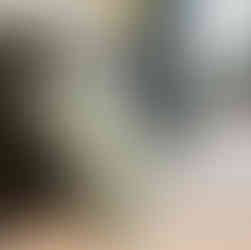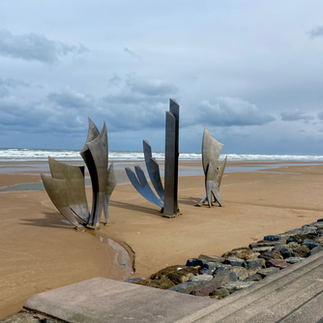Operation Overlord
- Joanna
- Apr 3, 2022
- 5 min read
Updated: Jun 28, 2023
D-Day would be the decisive blow required for the liberation of Europe. Bravery, determination and overwhelming firepower would allow the Allies to prevail. But the planners knew that the human cost would be high…
Set amongst the green pastures and the wild coastline, are the D-Day landing beaches and the somber reminder of the dark days of World War II. The rugged Normandy coast lies fairly peaceful now, but the forces of the allied armies coming together in the largest invasion force in human history, will never wash away with the waves..
Although I had always wanted to visit this area, I don’t think I was really quite prepared for how emotional a journey it would be. Having the freedom of our own vehicle, we drove the length of the coastline, stopping at 3 out of the 5 landing beaches. We saw Utah, Omaha and Juno.
Utah, Omaha, Juno, Gold and Sword… all code names for these sectors of the allied invasion.

Omaha was the beach that suffered the highest casualties, as well as the location of the Normandy American cemetery and memorial. The 174 acre burial ground is a haven of peace for fallen soldiers and 10,000 perfectly aligned white crosses that point home to America.
Juno, the landing beach for our Canadian troops. “Preceded by the paratroopers, transported and supported by the navy, and with air force protection from above, 14,000 Canadian volunteers swept in over the beaches. By the end of the day, the troops had succeeded in advancing quite a long way inland towards Cruelly, Columby-sur-Thaon and Anisy, falling short of their assigned objectives, but making sufficient inroads for the landing to be considered an unqualified success. During the 80-day campaign in Normandy, 5,500 Canadian soldiers lost their lives.”
Mere months from the 78th anniversary of D-Day, standing at the exact location of 10,000 Allied casualties and 4,414 confirmed dead, was profoundly moving… and utterly heartbreaking. We both teared up on more than one occasion.

It wasn’t the best day to put mascara on for the first time in a week.
Dumb move, Jo.
We stayed two nights in a delightful little hotel in a small, coastal village called Arromanches-les-Bain. A step high above our recent halfway house, this charming villa boasted boutique luxury, plump pillows, warm decor, serenity, comfort, an ocean view, a cozy lounge… and very expensive café au laits.
Seriously… I spat up when I saw the bill.
There goes my caffeine addiction here.
I think I need to take more time to appreciate gas station offerings, instead of berating them for cheap grab & go. It may not be the extravagance to which I intend to become accustomed, but they definitely suit my current financial situation.
What I really need to do is learn how to say “drip coffee” in French, instead of running around the country complaining about extravagant pricing and my lactose intolerance.
Now, I am fully aware that I have almost completely exhausted myself (and all others) in the conversation of the lack of open restaurants, but I think I might still have a bit of wiggle room left…
Maybe a little?
Our first trek along the boardwalk led us to a seaside, 5-star quality dining room. Cold, desperate and hungry, we went in to seek refuge from the elements and to check out the menu. The girl at the front desk, although English speaking, was hardly helpful in the food & beverage department. With every question we asked, we were met with a shrug and an off-hand comment, such as, “I don’t know” and “I don’t eat here.”
It was superior customer service.
Ace hospitality.
Brilliant.
We decided to take our culinary chances and headed back out into the bone-chilling frost of the evening, in search of an economical feast. And an economical feast, we did find. Paper table clothes, plastic glassware and rickety chairs adorned this modest neighbourhood diner… though the pricing was hardly moderate.
We both decided on the Croque-Monsieur, as a French hot ham & cheese sandwich seemed a fitting choice. Unfortunately, I think we may have to re-try this traditional snack, as it wasn’t exactly the appetizing delight we had been expecting. I should hardly complain, because it was food… and we all know how difficult that is to come by.
My face is bloated beyond recognition, and I’m at a loss as to why, considering my meals are few and far between. But… taking into consideration WHAT I eat, when I eat… I’m actually surprised my face isn’t fatter! Croque-monsieur, quiche, crêpes, foie gras, baguette, croissant, French onion soup, French fries, eclairs, chouquets and cheese for miles…
I just need to hit it home with some ratatouille, crème brûlée, profiteroles, fondue, soufflé and macaroons and I’m good to go. French dining bingo card complete ✔️

My body is screaming out for vegetables and fruit. It is time to voluntarily boycott all patisseries… when they’re open.
Arromanches, in the Port of Winston, where we are staying, was the place where a Mulberry harbour was installed. This temporary port allowed the disembarkation of 9,000 tons of material per day after the invasion. Part of it is still visible and pretty incredible.
On our second day in Normandy, we awoke to powerful winds and an ocean irate with storms, giving us a tiny glimpse of what Tuesday, June 6th, 1944 might have been like, and how rough of a landing it was for the soldiers.

The Juno Beach Canadian Museum, although touching, was very comparable to our National Park visitor centres. I don‘t know who was in charge of designing them all, but they tend to have a slightly elementary school theme. Our D-Day museum was no exception to the rule. Many exhibits were borderline juvenile, with simple interactive displays, geared more towards children than historians.
Each museum and memorial we visited highlighted the heroism of all involved. On such a horrendous day that captured history so significantly, there were so many personal accounts, quotes, private belongings, messages, stories and so much more.
D-Day was the turning point that brought Europe out of the iron grip of the Nazis, and all the bigotry, genocide, oppression and inhumanity they stood for. Chances of survival during the invasion was 1 in 4, but a miraculous 50% of soldiers survived. It was a devastating loss of lives, but fascinating learning more about their planning, techniques, training, strategy… and of course, the tremendous amount of lies and deceit surrounding each potential operation.
”In wartime, truth is so precious that she should always be attended by a bodyguard of lies.”
Winston Churchill
❤️
For the Fallen
They shall grow not old
As we that are left grow old;
Age shall not weary them
Nor the years condemn;
At the going down on the sun
And in the morning
We will remember them.
We will remember them.
Laurence Binyon
❤️
We will never forget…

























Comentarios